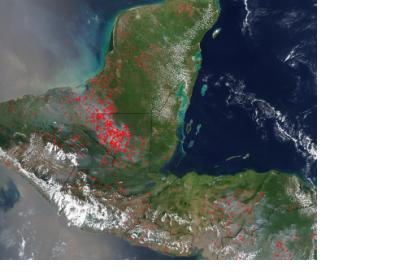United
Nations
Office for Outer Space Affairs
UN-SPIDER Knowledge Portal
UN-SPIDER's Regional Support Office CATHALAC (Water Center for the Humid Tropics of Latin America and the Caribbean) published a new study about fires in Central America. The analysis was carried out in the context of SERVIR - a Regional Visualization and Monitoring System created by NASA, USAID, CATHALAC and other partners.
The analysis observed hotspots across Central America for the dry season 2012 using satellite imagery obtained from MODIS. For the period January till March 2012 5533 hotspots have been identified caused by agricultural fires, forest fires and volcanic activities representing possible hazards for loss of forest or threatening vulnerable areas. 17 percent of the hotspots are suspected to be forest fires.
